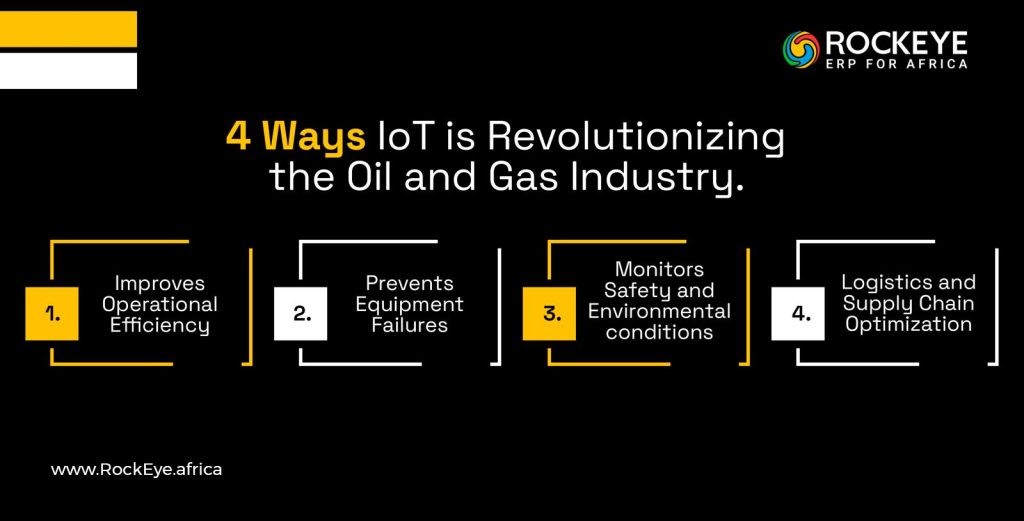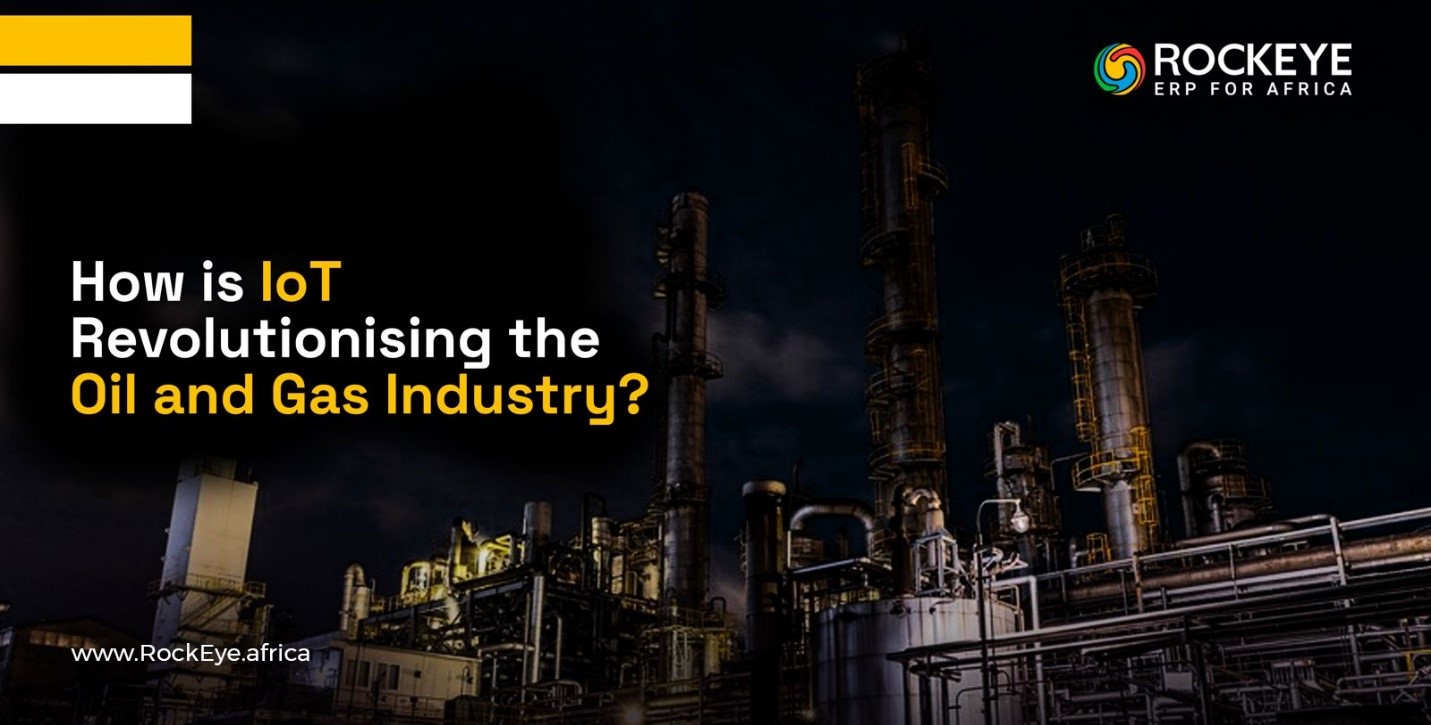4 Ways IoT is Revolutionising the Oil and Gas Industry
The emergence of the Internet has made things easy for everyone. Who wouldn’t want to live a seamless and effortless life? Who wouldn’t want to jump into a system that promises to bring magic into our everyday lives? All thanks to the innovative Internet of Things (IoT) concept.
Since its invention, IoT has revolutionised the way we live our lives. Businesses worldwide are already taking advantage of this new path as it is helping them become more efficient and productive, especially in a competitive business world such as this.
Industries such as healthcare, agriculture, manufacturing, finance, and hospitality have now understood the benefits of implementing IoT solutions into the day-to-day running of their businesses. However, we will be focusing more on the oil and gas industry in this article and how IoT has transformed its operations.
If you are into oil and gas, pay attention to how powerful IoT can be to your business. One significant benefit of implementing IoT software in your business is improving operational efficiency.
Operational efficiency could be as simple as monitoring your heartbeat on your smartwatch or measuring your steps with your phone. It’s a tool for oil and gas operators to connect IoT devices to build valuable insights across the various phases of operation and production.
Implementing the solution will help reduce downtime and improve performance across the board. That is why the oil and gas sector needs to leverage and invest in this technology for a better outcome for the industry.
In this article, we’ll explore how IoT is revolutionising the oil and gas industry and its positive impact on the lives of individuals around the world.
What is the Internet of Things (IoT)?
IoT, or Internet of Things, refers to the network of interconnected devices and systems that can communicate and share data. The system is crucial in optimising operations, improving safety measures, and increasing efficiency.
It is programmed in a way whereby the oil and gas industry gathers real-time data from sensors installed in equipment and infrastructure, by utilising IoT technology. This data can be used to monitor equipment performance, detect potential issues, and make informed decisions regarding maintenance and repairs.
Furthermore, IoT enables remote monitoring of assets in remote locations. This eliminates the need for manual inspections and reduces operational costs. It also enhances worker safety by minimising the need for human intervention in hazardous environments.
IoT has transformed the oil and gas industry by providing valuable insights through real-time analytics. It has revolutionised operational efficiency, reduced downtime due to equipment failures or maintenance issues, enhanced worker safety measures, and optimised resource allocation.
As technology advances, we can expect further integration of IoT in the sector to drive innovation and improve productivity.
The Evolution of IoT
The emergence of IoT is paving the path for a smoother experience for businesses. It’s an exciting technology that most companies are capitalising on to see that their business runs smoothly without hitches.
The emergence of IoT can be traced back to the late 20th century. The term was coined by Kevin Ashton in 1999. However, it wasn’t until the 2000s that IoT started gaining momentum. Adopting this technology improved the wireless connectivity, laying the foundation for the IoT expansion.
In the following years, the proliferation of smart devices and sensors, and the development of IPv6 (Internet Protocol version 6) contributed to the growth of IoT. Industries like healthcare, agriculture, and transportation began integrating IoT to enhance efficiency and gather valuable data.
Today, IoT continues to evolve with the rise of edge computing, 5G networks, and artificial intelligence. The interconnected nature of devices and the ability to collect and analyse vast amounts of data are reshaping industries and daily life.
The Benefits of IoT in the Oil and Gas Industry
IoT has significantly impacted the oil and gas industry, bringing about many benefits that span operational efficiency, safety, and environmental sustainability.
Let’s delve into the benefits and how it has reshaped the industry.
Remote Monitoring and Control
One of the fundamental benefits of IoT in the oil and gas sector is its ability to facilitate remote monitoring and control of critical infrastructure.
In an industry where operations often occur in remote and challenging environments, the real-time tracking of equipment and facilities is paramount.
IoT sensors deployed on equipment and machinery provide a continuous data stream, allowing operators to oversee operations from a centralised location.
This not only enhances operational efficiency but also significantly improves safety by reducing the need for personnel to be physically present in hazardous locations.
Predictive Maintenance
IoT revolutionizes maintenance strategies in the oil and gas industry by enabling predictive maintenance. Traditionally, maintenance was often reactive, with equipment being repaired or replaced after a failure.
IoT sensors, embedded in various components, continuously collect data on the health and performance of equipment. Advanced analytics algorithms then process this data to predict potential issues before they occur into critical failures.
The result is a proactive maintenance approach that minimises downtime, reduces repair costs, and extends the lifespan of the equipment.
Asset Tracking
IoT devices facilitate precise tracking of assets such as pipelines, vehicles, and equipment. This improves logistics, reduces losses, and enhances overall operational efficiency.
Devices such as GPS trackers and RFID tags enable precise tracking of assets throughout their lifecycle. The assets ensure optimal utilisation and facilitate timely decision-making.
Supply Chain Optimisation
IoT technologies enhance supply chain visibility by tracking the movement of materials and products in real-time. This visibility improves inventory management, reduces delays, and facilitates better coordination among different stakeholders in the supply chain.
Ultimately, this optimization leads to cost savings and increased overall efficiency.
4 Ways IoT is Revolutionising the Oil and Gas Industry

Improves Operational Efficiency
Imagine you have sensors installed on all your equipment. What the device does is constantly check how efficient the machines are and also check whether they are too hot, cold, or perfectly working right.Let’s say the machine starts acting up; the sensor sends an alert immediately. It’s like having a machine doctor tell you when something might go wrong.
Prevents Equipment Failures
The device helps you watch over your equipment even when you’re not watching. IoT prevents equipment failures by having sensors that monitor your equipment; it sends you a message when there is a problem, and helps you fix things before they are damaged.
Monitors Safety and Environmental Conditions
In this case, sensors are placed all around, watching out for dangers within the environment. If the safety sensors find any threat, they send messages. It’s like sending out messages quickly for things to be fixed as soon as possible..
Logistics and Supply Chain Optimization
IoT devices help move essential things. The logistic sensors are placed on these vehicles, keeping an eye on everything that goes on, no matter how fast or slow the vehicle moves.
When equipment is kept in a store room, the sensor counts every tool and ensures nothing runs out. You might want some goods to be where it needs to be at the right time.
By using data from the logistics sensor, you will be making a smart decision. Overall, IoT helps in counting inventory, finding the best routes and communicating with each other, preventing delays.
Conclusion
Ultimately, there has been a transformative impact on the oil and gas sector, which is evident in how the industry anticipates potential failures. The IoT’s role in safety, logistics, equipment failures, and operational efficiency cannot be overstated.
When sensors continuously assess environmental conditions, ensuring compliance with safety regulations, the industry fosters a culture of responsible and sustainable practices.
As the industry continues to embrace these technological advancements, it is poised to achieve more outstanding operational excellence and meet the evolving challenges of the future.
RockEye has a solution for you, one that will help you boost your oil and gas business operations.
Get in touch with us by visiting https://www.rockeye.africa/


